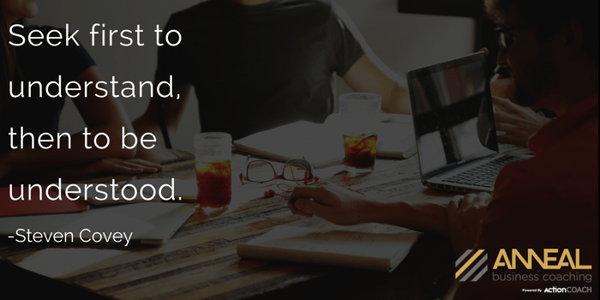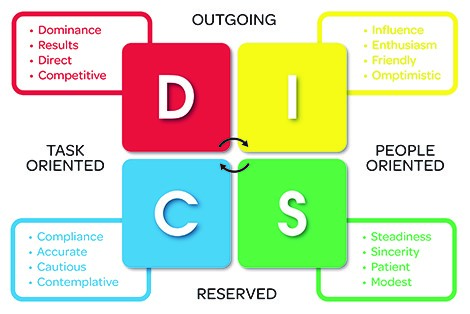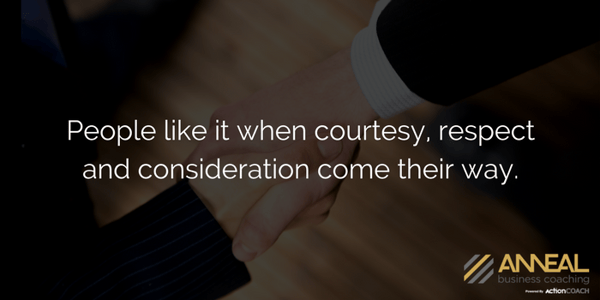5 MIN READ
Personalities. Most of us have them, and most of us have taken, or have at least have heard of, the DISC personality assessment. The assessment itself is an introspective quiz available online for free or for purchase from many vendors, in which we typically answer 24 questions.
The results show a combination of personality traits that indicate our behavioral tendencies in different situations. The results of the test provide a detailed description of how we are likely to behave as well as how people with different profiles are likely to react to us.

Most of us who have taken the assessment find the results interesting if, for no other reason, than we enjoy learning about ourselves, but if we use it properly, we will find it to be much more than just entertainment.
Schedule a Free Consultation Now
The test evaluates our answers across two pairs of opposite behavioral traits. The first pair is outgoing versus introverted behavior.
The second pair is task-oriented versus people-oriented behaviors.
The two pairings result in a matrix like the one show below, with each quadrant categorizing a characteristic behavioral profile.

The “D” in the name DISC stands for Dominant. A person with “D” profile has a combination of outgoing and task oriented behaviors.
An “I” personality is also outgoing, but more concerned with people than the task.
An “S” personality is concerned with people, but is more reserved than an “I”, and finally, the “C” personality is reserved and more concerned about accomplishing a task than with people.
Of course we are people, which means we are combinations of behaviors that don’t fit neatly into four little squares in a matrix. All of us exhibit the blended behavioral tendencies of more than one behavioral profile, and, to complicate things further, we exhibit different profiles in different environments such as at home, at work or with friends.
As we might expect, there are a lot (a whole lot!) of unique blended behavioral profiles resulting from the many possible combinations of traits and environments.
Fortunately, the combinations resolve into descriptive profiles such as high “D” or a high “S” that we can learn to identify in order to better get along with the people around us.
There is a wealth of information on the internet to help understand our own profiles, how to quickly identify other’s profiles, and to learn how others are likely to behave in response to our behaviors.
That’s all fun and interesting, but the information would be more valuable if we could put it to good use, and we can.
The first thing to understand is that this or that profile is NOT a prerequisite to this or that job. For example, we might reasonably suspect that great CEOs should have dominant, so-called high “D, profiles, in order to lead people, or we might guess that great salespeople should have outgoing, high “I” profiles in order to engage and relate to customers.
"This or that profile is NOT a prerequisite to this or that job."
Both assumptions seem reasonable, but don’t hold up. Many studies and lots of experience (including my own) have shown that DISC profiles alone are not good predictors of job success. There are both great CEOs and successful salespeople with every possible combination of DISC profiles.
The second thing to understand is that we don’t “create” our profiles. A client recently asked me if he should aim for the bull’s-eye, by which he meant should he strive for a blended profile that would put him at the center of the matrix.
My answer was “no,” not only for the reason given in the paragraph above, but also for the reason that he couldn’t do it, at least not for the long term. We are who we are. We can temporarily adapt our behaviors to different situations, but our underlying tendencies, profiles and personalities remain unchanged.
"We are who we are."
So, if a particular profile doesn’t qualify or disqualify us for the job we want, and if we couldn’t change much even if we wanted to, what good is the DISC assessment?
We can get an idea from habit number 5 in Steven Covey’s book, “The Seven Habits of Highly Effective People.”
Habit number 5 tells us to “Seek first to understand, then to be understood.” It is a critical behavior for getting along with people.
When we understand how other people like to be treated and we understand our how our behaviors affect them, we can temporarily modify our behaviors in deference to them as a sign of courtesy, respect and consideration.
People like it when courtesy, respect and consideration come their way.

To show what I mean, suppose you are the proud owner of a high “I” profile. High “I”s tend to be talkative, like to tell stories and maybe a few jokes before getting down to business.
Now suppose you are interacting with a high “C” accountant in your office. High “C”s want to get things done. They want you to sign the expense report, put it in the right box, and leave so they can get back to work on their spreadsheets.
You could insist that the high “C” suffer through your stories, fuming all the while, or you could sign the report and save the stories and jokes for your high “I” buddies. It’s is easy to see which approach would have the greatest positive effect on your relationship with the accountant.
A philosophy of seeking first to understand, and a commitment to courtesy, respect and consideration, is the key to improving relations with everyone including our families, co-workers, superiors, subordinates, customers, and friends.
It doesn't always work, but it’s our best shot. The highest and best use of DISC is to provide the information we need to put the philosophy into practice.
Is there someone in your life who drives you crazy, but you don’t understand why? Do you drive certain people crazy? Is there discord in your office, that you can’t explain? Are you willing to adapt your behaviors in deference to others?